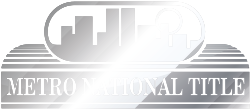One of the key areas of a real estate transaction are title and escrow fees. When buying a home, you should be prepared with the right closing cost information on those fees and other expenses.
Here's what home buyers should know, when it comes to title and escrow fees:
The Basics of Title and Escrow
A title company is responsible for handling title and escrow needs for home buyers and sellers. During the transaction, the company performs a title search to ensure that the home has "clear" title. That means no recording errors, unpaid liens, or other problems. The title company will also arrange for a title insurance policy for the buyer and the lender. That protects you the entire time you own your home, and the lender will also be protected until your mortgage is paid off.
Escrow includes funds management as well as the managing of documents related to the home purchase. It is very important to have a title company or other qualified third party handle the transaction, in order to protect security and privacy, and to provide accuracy.
Cost of Fees for Title and Escrow
The title and escrow fees are part of the closing costs. The total amount the cost will vary by where you live, the sales price of the property, and the mortgage company you're working with. Usually, these costs are between 1% and 3% of the total purchase price. Most title companies use specific formulas to address how these fees are calculated. There is generally a base rate, and then a percent per thousand dollars of purchase price.
Particularly with title insurance, there are additional variables that can affect the cost. These include seller negotiations, state regulations, and the full components of the policy.
Who Pays for the Title & Escrow Fees?
Both the buyer and seller share in the costs for Title Insurance. Typically, the seller pays for the Owners Policy, while the buyer pays for the Lender’s Policy, although the Lender’s Policy is generally less than the owners policy as it covers a limited set of risks. It is also not uncommon for the buyer and the seller to have some negotiations regarding closing costs.
Distribution of Fees
When it's time for closing, the escrow officer distributes fees and closing costs, which can include:
- Taxes and county fees
- Charges to third-party providers
- Real estate commissions
- Loan/lender fees
- Profits to the seller
After a completed closing, the title company ensures that all the documents are recorded with the county and any other necessary agencies. The recording is important, because it makes sure that the new homeowner's legal rights are properly secured. Upon the recording of the transaction, funds are disbursed to all parties.
Other Fees in the Real Estate Transaction
The majority of the cost of a home purchase, outside of the purchase price, is in the title and escrow fees. Depending on the property and the needs of the home buyer, there may also be other costs that are part of the completed transaction. There are appraisal fees that are also needed when evaluating a home, and those help to ensure the home is appraised and worth the selling price.
Depending on your location, other common fees include:
- Mortgage loan closing costs
- Credit report charges
- Assignment recording fee
- Closing protection letter for funds disbursement
- Flood certification
Certain title and escrow fees are unavoidable, but there are some that are negotiable. By working with a title company you can trust, you'll get transparent communication throughout your transaction, so you can complete it more easily.



